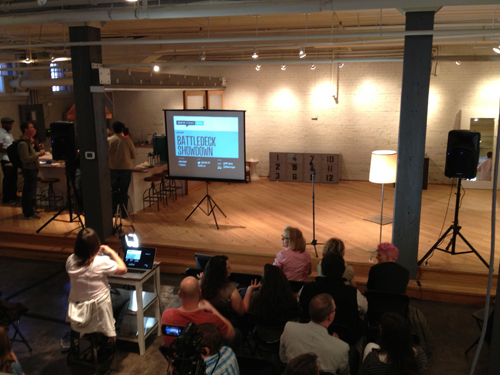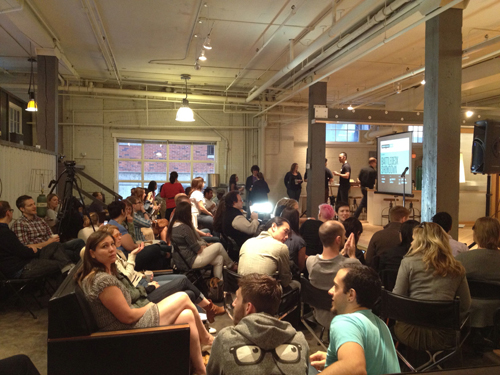What I learned from Powerpoint Karaoke
Everyone has fears about regular public speaking, but what if you have to present someone else’s slides? And see them for the first time as the audience does? And only have 5 minutes? And the slides auto-advance?
I believe in the theory of trying something insanely hard to make normal work feel easier. As a public speaking expert, I had to try this at least to see what I could learn for you readers.
So what is Powerpoint Karaoke? Despite the name, there is no singing. Instead, a bunch of people are asked to present in front of a live audience but with (Powerpoint) slides they have never seen before.
In 2012 I participated in a Powerpoint-Karaoke (also know as BattleDecks) at the Makers co-working Space in Seattle (part of Seattle Creative Mornings). It’s as crazy as it sounds. I participated precisely because it’s crazy. Other space monkeys willing to try were Adam Tratt, Hillel Cooperman, Jon Culver (the winner) and Michelle Mazur.

The rules were simple:
- We get five minutes to speak
- The slide decks are made by the organizers
- The slides auto advance every 15 seconds
- There are no other rules
- Audience votes on the winner
Here’s what I learned in preparing:
- There was no effective way to prepare. Surprise! Good advice for presentations hinges on having good material and practicing it. Neither is possible in this format. This was both terrifying and liberating.
- I tried to prepare anyway. I found videos of others doing PowerPoint Karaoke. They were strange to watch since the presentations are unavoidably bad in any formal sense, but the live audiences have unusual responses. They expect it to be bad and have an unusual set of expectations for what they’re going to experience. Some of the best-received presenters disregarded the slides, which was effective but felt like cheating. Although there were no official rules, I decided if I did this I should buy into the spirit of it, at least the first time
- It’s a crash course in improvisation. A decade ago I took a course in improvisational theater. I reviewed the lessons, including a refresher on “Yes, and…” which is shorthand for the mindset of faithfully committing to whatever happens.Powerpoint Karaoke is at its heart an exercise in improvisational theater.

Here’s what I learned after I presented:
- You play for comedy. There is no way to take the slides seriously since by design they are ridiculous. I didn’t realize the full extent of this, as obvious as it seems now, until later. At best you are making the audience laugh, at worst they watch in silence as you struggle on stage. It’s purely stunt presenting. No one is there to learn or be inspired, at least not directly.
- The audience wants spectacle. Mid-way through Hillel’s talk he abandoned his slides, and the format. In what was one of the most interesting experiences I’ve seen at an event like this he politely, but firmly, confronted the audience about why they were there. As awkward as it was he was entirely accurate – it is a weird kind of theater that wants to see speakers work against, and likely fail because of, the unfair challenges. There’s an element of wanting to watch cars crash in this event. It’s all in good fun, but also schadenfreudian.
- The energy is weird. Good speakers (and comedians) build a rhythm with the audience through their material. The pacing of jokes, how certain facts are revealed, all build to something. But here since the speakers don’t know the slides the energy is weird – sometimes very funny things happen, but often there are complete misfires. Sometimes the audience laughs but the speakers don’t know why. Sometimes the speakers think the audience should be laughing, but doesn’t know why they aren’t.
- Michelle Mazur is brave. There were only 4 speakers on the agenda, with an extra battle deck for a volunteer from the audience. Michelle volunteered after seeing the four of us perform. I thought for sure no one would be brave enough, but she proved me wrong.
Advice:
- There is no way to be good at this. This is liberating. It was very hard for me to say who of the five speakers did the best job. They were all weird, funny, awkward, and interesting in different ways. It really is more like experimental theater than anything like a public speech.
- Make sure you trust the hosts. Luz Bratcher made the slides for this event and did a great job. If the person making the slides wants to screw all the speakers it’s easy to do, as if the slides are thoughtless speakers won’t have much to work with. You want the hosts to make it a challenge, but to give you well crafted slides that are funny all on their own and give the speakers plenty to work with (You can see the slides Luz made below).
- I would have preferred to use an actual deck from a random event. By this I mean, give me a slide deck from a brain surgery conference, or a law accounting event. Then even though I have to make things up, there is a sane structure in there somewhere, and the audience can enjoy the attempt to follow an actual expert’s intention. By having a designer make original slides, it’s far too random and (I think) less interesting in several ways.
What I’d change about the format:
- Let speakers control the slides. If you kept the 5 minute limit, but let the speakers control when a slide advanced, they’d have slightly more power over delivery. That adjustment would dramatically improve their ability to make the slides work. It would still be very hard, but the auto-advance works against everyone’s interests in this case.
- Do it at night, after drinks. We did ours as part of Creative Mornings, which means IT’S THE MORNING. People are going to work right after. It’s not the right time for crazy and absurd. Crazy works better after work, or at night, or following a happy hour where everyone is midway through letting off steam after a long day. Mornings mean people are going to work afterwards, they’re charging up, not winding down.
- Use real presentation slides. I’ve always wanted to get the slide deck from a medical conference, or a corporate retreat for a company I’ve never heard of, and make up a presentation in real time for that. Real slide decks have a continuity built in to them that fabricated battledecks never do.
Here are the slides Luz made for each speaker:
